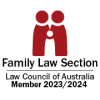Mediating Your Family Dispute Amicably And Effectively
The directors at De Saxe O’Neill Family Lawyers have years of experience with representing clients in mediation and Family Dispute Resolution (FDR). They will assist you in preparing for both mediation or FDR. In addition, they can attend mediation with you to advise and assist you in reaching an out of court settlement.
In Mediation and Family Dispute Resolution you will have a practitioner who is an independent and neutral person. The FDR Practitioner will not take sides and will encourage parents to think about what is best for the children. They will take into consideration the children’s age, stage of development, and the particular circumstances of the family. For financial matters, FDRs will work through the various options and facilitate the making of joint decisions. Mediation allows for an informal, non-conflictual and confidential environment.
The discussions in Family Dispute Resolution and mediation remain confidential. Typically, they cannot be used as evidence in court unless the disclosure of risk or abuse occurs. The Family Law Act mandates that parents must attempt to resolve their conflicts through FDR before initiating an application for parenting orders.
If you are looking for advice from skilled lawyers to guide you through the processes of mediation and FDR, we are the firm for you. Get in touch with De Saxe O’Neill today, visit our contact page or call us on 02 9948 3820.
What Happens During a Family Dispute Resolution?
Family Dispute Resolution is a process designed to help separating couples resolve disputes around parenting, property, or financial matters without going to court. It often begins with an individual meeting with a mediator, who assesses whether FDR is suitable based on the situation and the parties’ willingness to negotiate. If approved, both parties attend a joint session where they can openly discuss their concerns and work toward a compromise, guided by the mediator.
The mediator ensures the discussions are respectful and focused on reaching a practical solution. If an agreement is reached, it can be formalised in writing and potentially submitted as a consent order. If no resolution is found, the mediator can issue a certificate, which may be necessary before either party can apply to the court for legal proceedings.
FDR offers a more collaborative and less stressful alternative to resolving disputes compared to court proceedings.









